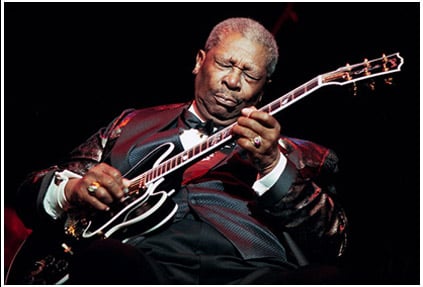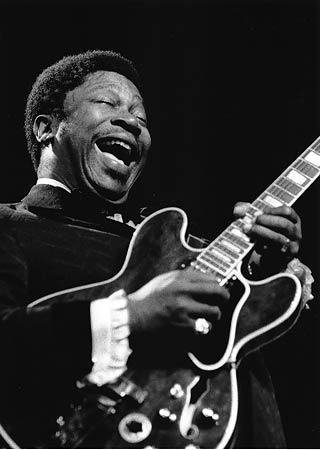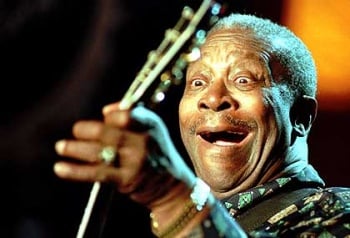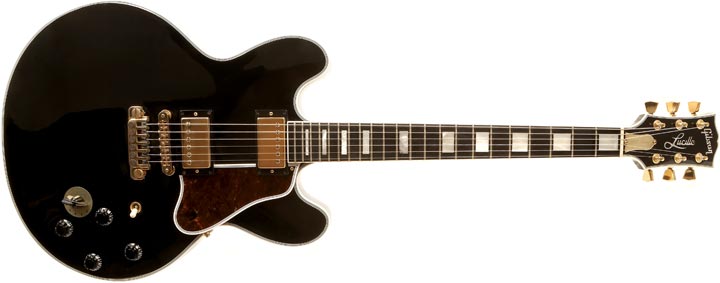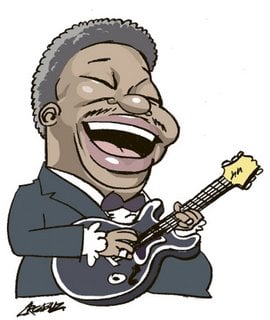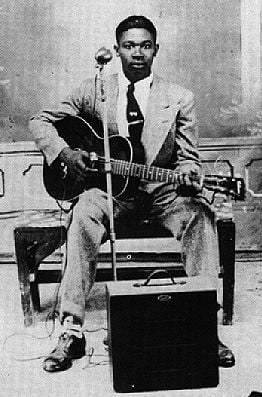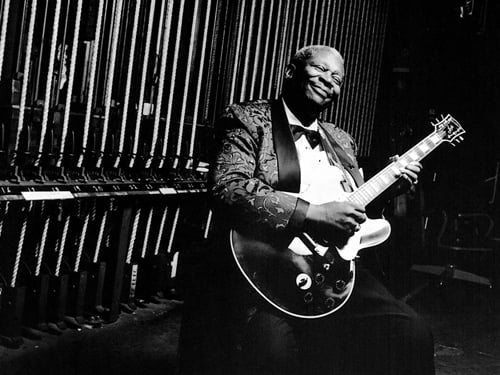B.B. King
| (10 intermediate revisions not shown.) | |||
| Line 1: | Line 1: | ||
[[Category:Guitarists]] | [[Category:Guitarists]] | ||
| - | [[Image:king1.jpg|thumb| | + | [[Image:king1.jpg|thumb|450px|B.B. King]] |
| - | + | ||
| - | + | ||
== Introduction == | == Introduction == | ||
| + | <br> | ||
B.B. King is a legendary American Bluesman, gifted guitarist, composer and singer. | B.B. King is a legendary American Bluesman, gifted guitarist, composer and singer. | ||
| - | King has taken part in more than 60 albums, with different artits or on his own. He has won 14 Grammys and received dozens of awards and honors over the years, and he still performs several nights a week. He belongs to the Rock n' Roll Hall of Fame, and stands in the 3rd position of Rolling Stone's "100 Greatest Guitarists of All Time". | ||
| + | King has taken part in more than 60 albums, with different artists or on his own. He has won 14 Grammys and received dozens of awards and honors over the years, and he still performs several nights a week. He belongs to the Rock n' Roll Hall of Fame, and stands in the 3rd position of Rolling Stone's "100 Greatest Guitarists of All Time". | ||
| Line 15: | Line 14: | ||
== Early days to Three O'Clock Blues == | == Early days to Three O'Clock Blues == | ||
| + | <br> | ||
Riley Ben King, known as B.B. King, was born the 16th of September of 1925 in Itta Bena, Mississippi. His father abandoned the family and his mother died when King was just 9 years old, so he spent the rest of his childhood living with his grandmother in Kilmichael, attending school (which he didn't finish), and working at the cotton fields. | Riley Ben King, known as B.B. King, was born the 16th of September of 1925 in Itta Bena, Mississippi. His father abandoned the family and his mother died when King was just 9 years old, so he spent the rest of his childhood living with his grandmother in Kilmichael, attending school (which he didn't finish), and working at the cotton fields. | ||
| - | + | ||
When he reached the age of fourteen he got his first guitar, and started singing gospel songs. One year later his grandmother died, and he went to Lexington, to live with his father's new family. Country music, gospel and the rich Mississippi Delta blues heavily influenced his style these early years. | When he reached the age of fourteen he got his first guitar, and started singing gospel songs. One year later his grandmother died, and he went to Lexington, to live with his father's new family. Country music, gospel and the rich Mississippi Delta blues heavily influenced his style these early years. | ||
| + | |||
Come 1946 he decided to move to Memphis, with his guitar and a couple bucks in his pocket. There he lived with his cousin Bukka White, famous Delta blues singer and guitarist, who taught B.B. King the fine art of playing the blues. Soon he began to work as a DJ in Memphis radio station WDIA, and that's how he got the nickname "Beale Street Blues Boy", which eventually evolved into "Blues Boy" and later the worldwide known "B.B." that has accompanied him for life. | Come 1946 he decided to move to Memphis, with his guitar and a couple bucks in his pocket. There he lived with his cousin Bukka White, famous Delta blues singer and guitarist, who taught B.B. King the fine art of playing the blues. Soon he began to work as a DJ in Memphis radio station WDIA, and that's how he got the nickname "Beale Street Blues Boy", which eventually evolved into "Blues Boy" and later the worldwide known "B.B." that has accompanied him for life. | ||
| + | |||
In 1949, being 24 years old, King recorded his first four tracks with Bullet Records, and later he signed with RPM records, recording lots of tracks the following two years which eventually led to B.B. King's first top of the charts single "Three O'Clock Blues" in 1951, after which he went on the first of his long, massive tours. | In 1949, being 24 years old, King recorded his first four tracks with Bullet Records, and later he signed with RPM records, recording lots of tracks the following two years which eventually led to B.B. King's first top of the charts single "Three O'Clock Blues" in 1951, after which he went on the first of his long, massive tours. | ||
| + | |||
== The 50s == | == The 50s == | ||
| + | <br> | ||
After his success with "Three O'Clock Blues" B.B. King began to be more and more famous, and he recorded so many tracks that he had to leave from Memphis to L.A. with RPM Records, producing hits such as "You Know I Love You" (1952), "Woke Up This Morning" and "Please Love Me" (1953), "When My Heart Beats like a Hammer," "Whole Lotta' Love," and "You Upset Me Baby" (1954), "Every Day I Have the Blues", the blues ballad "Sneakin' Around," and "Ten Long Years" (1955), "Bad Luck," "Sweet Little Angel", "On My Word of Honor" (1956); and "Please Accept My Love" (1958). | After his success with "Three O'Clock Blues" B.B. King began to be more and more famous, and he recorded so many tracks that he had to leave from Memphis to L.A. with RPM Records, producing hits such as "You Know I Love You" (1952), "Woke Up This Morning" and "Please Love Me" (1953), "When My Heart Beats like a Hammer," "Whole Lotta' Love," and "You Upset Me Baby" (1954), "Every Day I Have the Blues", the blues ballad "Sneakin' Around," and "Ten Long Years" (1955), "Bad Luck," "Sweet Little Angel", "On My Word of Honor" (1956); and "Please Accept My Love" (1958). | ||
| + | |||
In 1953 he moved to Houston where he played with Bill Harvey's band. When Bill had to stop due to helth problems he took the lead. By that time B.B. King was famous acroos the nation, in 1955, he used to go on tour 300 nights a year playing for hours each time. White teenagers started to pay attention to "black" music, and he became a main-stream success, influencing a legion of guitarists & artists to come, including a young Elvis Presley who used to attend his shows as often as he could. | In 1953 he moved to Houston where he played with Bill Harvey's band. When Bill had to stop due to helth problems he took the lead. By that time B.B. King was famous acroos the nation, in 1955, he used to go on tour 300 nights a year playing for hours each time. White teenagers started to pay attention to "black" music, and he became a main-stream success, influencing a legion of guitarists & artists to come, including a young Elvis Presley who used to attend his shows as often as he could. | ||
| Line 34: | Line 39: | ||
== The 60s == | == The 60s == | ||
| + | <br> | ||
| + | |||
[[Image:king2.jpg|thumb|350px|right|B.B. King]] | [[Image:king2.jpg|thumb|350px|right|B.B. King]] | ||
In the early 60s B.B. King signed with ABC-Paramount records, and kept releasing top selling songs such as "Sweet Sixteen" (originally from Joe Turner), "Got a right to love my baby" and "Partin' Time". | In the early 60s B.B. King signed with ABC-Paramount records, and kept releasing top selling songs such as "Sweet Sixteen" (originally from Joe Turner), "Got a right to love my baby" and "Partin' Time". | ||
| + | |||
In 1964 he released one of his all-time best albums, the "Live at the Regal", recorded in Chicago, regarded as one of the greatest ever blues albums. later that same year he released another famous track "How blue can you get", followed by "Don't Answer the Door" and specially "Paying the Cost to Be the Boss", which reached top ten a couple years later. | In 1964 he released one of his all-time best albums, the "Live at the Regal", recorded in Chicago, regarded as one of the greatest ever blues albums. later that same year he released another famous track "How blue can you get", followed by "Don't Answer the Door" and specially "Paying the Cost to Be the Boss", which reached top ten a couple years later. | ||
| + | |||
In 1969 he recorded "Why I sing the blues", and it was in that same year that B.B. King would release what is probably his most famous track to date, the one that made him world-wide known and forever regarded as one of the best blues men taht ever existed, "The Thrill is Gone", which got high in blues and pop lists alike. | In 1969 he recorded "Why I sing the blues", and it was in that same year that B.B. King would release what is probably his most famous track to date, the one that made him world-wide known and forever regarded as one of the best blues men taht ever existed, "The Thrill is Gone", which got high in blues and pop lists alike. | ||
| + | |||
== The 70s == | == The 70s == | ||
| + | <br> | ||
Although the 70s were not kind years for bluesmen, B.B. King managed to stay in shape and kept getting good sales in those years. Hits such as "To Know You is To Love You" and "I Like to Live the Love" were amongst the most popular songs from the early 70s. | Although the 70s were not kind years for bluesmen, B.B. King managed to stay in shape and kept getting good sales in those years. Hits such as "To Know You is To Love You" and "I Like to Live the Love" were amongst the most popular songs from the early 70s. | ||
| + | |||
Come 1976 he released some duets along with Bland, and later in 1978 he joined the Jazzy Crusaders and released "When it all comes down" and " Never make your move too soon". He also released the country sounding album "Love me tender", but it's not regarded as one of his best though. | Come 1976 he released some duets along with Bland, and later in 1978 he joined the Jazzy Crusaders and released "When it all comes down" and " Never make your move too soon". He also released the country sounding album "Love me tender", but it's not regarded as one of his best though. | ||
| Line 50: | Line 62: | ||
== From the 80s to Present Days == | == From the 80s to Present Days == | ||
| + | <br> | ||
| + | |||
[[Image:king3.jpg|thumb|350px|right|B.B. King]] | [[Image:king3.jpg|thumb|350px|right|B.B. King]] | ||
B.B. King released some remarkable LPs during the 80s such as "World Somewhere" (1981) and "My guitar sings the Blues" in 1986. One year later he received a Grammy Award for his dedication to music. | B.B. King released some remarkable LPs during the 80s such as "World Somewhere" (1981) and "My guitar sings the Blues" in 1986. One year later he received a Grammy Award for his dedication to music. | ||
| + | |||
In the 90s he released "Live at San Quentin" (1990), "Live at the Apollo" (1991) and Blues Summit (1992). | In the 90s he released "Live at San Quentin" (1990), "Live at the Apollo" (1991) and Blues Summit (1992). | ||
| + | |||
Though he didn't record quite as much as in the past he kept going on frenzy tours, playing over 300 gigs per year. He also made some unforgettable collaborations, such as the one with U2 in "When Love Comes to Town", or 2000s awesome album "Riding with the King" along with [https://www.guitarmasterclass.net/wiki/index.php/Eric_Clapton Eric Clapton], with whom he also went to Crossroads Festival in 2007. | Though he didn't record quite as much as in the past he kept going on frenzy tours, playing over 300 gigs per year. He also made some unforgettable collaborations, such as the one with U2 in "When Love Comes to Town", or 2000s awesome album "Riding with the King" along with [https://www.guitarmasterclass.net/wiki/index.php/Eric_Clapton Eric Clapton], with whom he also went to Crossroads Festival in 2007. | ||
| + | |||
Thinking of retirement, B.B. King had gone on his "Farewel Tour" during 2006, but truth is he reappeared several times after that in Brazil, Crossroads festival and Chicago Blues Festival 2008. | Thinking of retirement, B.B. King had gone on his "Farewel Tour" during 2006, but truth is he reappeared several times after that in Brazil, Crossroads festival and Chicago Blues Festival 2008. | ||
| + | |||
== B.B. King Gear == | == B.B. King Gear == | ||
| + | <br> | ||
| - | B.B. King was actually born with built-in ultimate gear: his fingers! But if we go beyond that little detail, next thing everyone notices is his beloved "Lucille" guitar: Lucille is a modified black Gibson ES-335, a semihollow electric with two humbuckers, equipped with Gibson B.B. King Signature strings, Signature Gauge .010 .013 .017p .032w .045w .054w. | + | B.B. King was actually born with built-in ultimate gear: his fingers! But if we go beyond that little detail, next thing everyone notices is his beloved "Lucille" guitar: Lucille is a modified black [https://www.guitarmasterclass.net/wiki/index.php/Gibson Gibson] ES-335, a semihollow electric with two humbuckers, equipped with [https://www.guitarmasterclass.net/wiki/index.php/Gibson Gibson] B.B. King Signature strings, Signature Gauge .010 .013 .017p .032w .045w .054w. |
[[Image:lucille.jpg]] | [[Image:lucille.jpg]] | ||
| - | The name of the guitar comes from a gig back in 1949. A couple guys there got into a fight over a woman, and they ended setting the club on fire. B.B. King scaped, but then he realised he had forgotten his guitar inside. Risking his life to save the guitar, he asked what the name of the woman that the two men were fighting for was, and it turned out to be LUcille. Ever since he has named his guitars "Lucille" (there are several "Lucilles"!), and [https://www.guitarmasterclass.net/wiki/index.php/Gibson Gibson] even released an official model resembling B.B. Kings modifications, in 1981. These modifications include the fine-tuner tailpiece, the semi-hollow body with no soundholes, the varitone 6 way control which enables a huge range of different tones and, of course, "Lucille" engraved in the headstock. | ||
| - | B.B. Kings preferred amp is a Lab Series L5, which is a solid-state 2×12 combo, but he also is known to use [https://www.guitarmasterclass.net/wiki/index.php/Fender Fender] Twin Reverbs with Altec Lansing speakers when he doesn't have a Las Series 5 available. | + | The name of the guitar comes from a gig back in 1949. A couple guys there got into a fight over a woman, and they ended setting the club on fire. B.B. King scaped, but then he realised he had forgotten his guitar inside. Risking his life to save the guitar, he asked what the name of the woman that the two men were fighting for was, and it turned out to be Lucille. Ever since he has named his guitars "Lucille" (there are several "Lucilles"!), and [https://www.guitarmasterclass.net/wiki/index.php/Gibson Gibson] even released an official model resembling B.B. Kings modifications, in 1981. These modifications include the fine-tuner tailpiece, the semi-hollow body with no soundholes, the varitone 6 way control which enables a huge range of different tones and, of course, "Lucille" engraved in the headstock. |
| + | |||
| + | |||
| + | B.B. King's preferred amp is a Lab Series L5, which is a solid-state 2×12 combo, but he also is known to use [https://www.guitarmasterclass.net/wiki/index.php/Fender Fender] Twin Reverbs with Altec Lansing speakers when he doesn't have a Las Series 5 available. | ||
| + | |||
King's magnificent voice goes through a Shure SM58 microphone, wedge monitors, and side fills. His amp is miked with a Shure SM57. | King's magnificent voice goes through a Shure SM58 microphone, wedge monitors, and side fills. His amp is miked with a Shure SM57. | ||
| Line 75: | Line 97: | ||
== Style & Influences == | == Style & Influences == | ||
| + | <br> | ||
| + | |||
[[Image:king4.jpg|thumb|350px|right|B.B. King]] | [[Image:king4.jpg|thumb|350px|right|B.B. King]] | ||
His main influences were bluesmen T-Bone Walker, Lonnie Johnson, Blind Lemon Jefferson, Elmore James, Bukka White (who was his cousin), Robert Lockwood ,Lowell Fulson, and also jazz players such as Charlie Christian and Django Reinhardt. A mixture of Blues and Gospel in his early days, spiced with some Country & Jazz are the key to his amazing, emotive, articulate licks. | His main influences were bluesmen T-Bone Walker, Lonnie Johnson, Blind Lemon Jefferson, Elmore James, Bukka White (who was his cousin), Robert Lockwood ,Lowell Fulson, and also jazz players such as Charlie Christian and Django Reinhardt. A mixture of Blues and Gospel in his early days, spiced with some Country & Jazz are the key to his amazing, emotive, articulate licks. | ||
| + | |||
Famous for his mastery of vibrato finger technique and sliding bent notes, B.B. King is actually someone who has influenced generations of guitarists and artists such as Buddy Guy, [https://www.guitarmasterclass.net/wiki/index.php/Eric_Clapton Eric Clapton], [https://www.guitarmasterclass.net/wiki/index.php/SRV Stevie Ray Vaughan], George Harrison, [https://www.guitarmasterclass.net/wiki/index.php/Jimi_Hendrix Jimi Hendrix] and Jeff Beck, to name just a few. | Famous for his mastery of vibrato finger technique and sliding bent notes, B.B. King is actually someone who has influenced generations of guitarists and artists such as Buddy Guy, [https://www.guitarmasterclass.net/wiki/index.php/Eric_Clapton Eric Clapton], [https://www.guitarmasterclass.net/wiki/index.php/SRV Stevie Ray Vaughan], George Harrison, [https://www.guitarmasterclass.net/wiki/index.php/Jimi_Hendrix Jimi Hendrix] and Jeff Beck, to name just a few. | ||
| + | |||
B.B. King is a living legend, an American icon, the "King of the blues": someone to be admired and remembered forever. | B.B. King is a living legend, an American icon, the "King of the blues": someone to be admired and remembered forever. | ||
| + | |||
| + | |||
== Interesting Facts about B.B. King == | == Interesting Facts about B.B. King == | ||
| + | <br> | ||
- Married twice: in 1944 and 1958<br> | - Married twice: in 1944 and 1958<br> | ||
| Line 93: | Line 122: | ||
- He has two honorary doctorates in music from Yale and Brown<br> | - He has two honorary doctorates in music from Yale and Brown<br> | ||
- Vegetarian<br> | - Vegetarian<br> | ||
| - | - He is a Licensed Pilot<br> | + | - He is very active in guitar workshops & seminars, and is very keen on teaching guitar.<br> |
| + | - He is a Licensed Pilot <br> | ||
- He doesn't smoke, nor drink<br> | - He doesn't smoke, nor drink<br> | ||
- He owns clubs in Memphis, L.A. and NYC<br> | - He owns clubs in Memphis, L.A. and NYC<br> | ||
Current revision
Contents |
Introduction
B.B. King is a legendary American Bluesman, gifted guitarist, composer and singer.
King has taken part in more than 60 albums, with different artists or on his own. He has won 14 Grammys and received dozens of awards and honors over the years, and he still performs several nights a week. He belongs to the Rock n' Roll Hall of Fame, and stands in the 3rd position of Rolling Stone's "100 Greatest Guitarists of All Time".
History
Early days to Three O'Clock Blues
Riley Ben King, known as B.B. King, was born the 16th of September of 1925 in Itta Bena, Mississippi. His father abandoned the family and his mother died when King was just 9 years old, so he spent the rest of his childhood living with his grandmother in Kilmichael, attending school (which he didn't finish), and working at the cotton fields.
When he reached the age of fourteen he got his first guitar, and started singing gospel songs. One year later his grandmother died, and he went to Lexington, to live with his father's new family. Country music, gospel and the rich Mississippi Delta blues heavily influenced his style these early years.
Come 1946 he decided to move to Memphis, with his guitar and a couple bucks in his pocket. There he lived with his cousin Bukka White, famous Delta blues singer and guitarist, who taught B.B. King the fine art of playing the blues. Soon he began to work as a DJ in Memphis radio station WDIA, and that's how he got the nickname "Beale Street Blues Boy", which eventually evolved into "Blues Boy" and later the worldwide known "B.B." that has accompanied him for life.
In 1949, being 24 years old, King recorded his first four tracks with Bullet Records, and later he signed with RPM records, recording lots of tracks the following two years which eventually led to B.B. King's first top of the charts single "Three O'Clock Blues" in 1951, after which he went on the first of his long, massive tours.
The 50s
After his success with "Three O'Clock Blues" B.B. King began to be more and more famous, and he recorded so many tracks that he had to leave from Memphis to L.A. with RPM Records, producing hits such as "You Know I Love You" (1952), "Woke Up This Morning" and "Please Love Me" (1953), "When My Heart Beats like a Hammer," "Whole Lotta' Love," and "You Upset Me Baby" (1954), "Every Day I Have the Blues", the blues ballad "Sneakin' Around," and "Ten Long Years" (1955), "Bad Luck," "Sweet Little Angel", "On My Word of Honor" (1956); and "Please Accept My Love" (1958).
In 1953 he moved to Houston where he played with Bill Harvey's band. When Bill had to stop due to helth problems he took the lead. By that time B.B. King was famous acroos the nation, in 1955, he used to go on tour 300 nights a year playing for hours each time. White teenagers started to pay attention to "black" music, and he became a main-stream success, influencing a legion of guitarists & artists to come, including a young Elvis Presley who used to attend his shows as often as he could.
The 60s
In the early 60s B.B. King signed with ABC-Paramount records, and kept releasing top selling songs such as "Sweet Sixteen" (originally from Joe Turner), "Got a right to love my baby" and "Partin' Time".
In 1964 he released one of his all-time best albums, the "Live at the Regal", recorded in Chicago, regarded as one of the greatest ever blues albums. later that same year he released another famous track "How blue can you get", followed by "Don't Answer the Door" and specially "Paying the Cost to Be the Boss", which reached top ten a couple years later.
In 1969 he recorded "Why I sing the blues", and it was in that same year that B.B. King would release what is probably his most famous track to date, the one that made him world-wide known and forever regarded as one of the best blues men taht ever existed, "The Thrill is Gone", which got high in blues and pop lists alike.
The 70s
Although the 70s were not kind years for bluesmen, B.B. King managed to stay in shape and kept getting good sales in those years. Hits such as "To Know You is To Love You" and "I Like to Live the Love" were amongst the most popular songs from the early 70s.
Come 1976 he released some duets along with Bland, and later in 1978 he joined the Jazzy Crusaders and released "When it all comes down" and " Never make your move too soon". He also released the country sounding album "Love me tender", but it's not regarded as one of his best though.
From the 80s to Present Days
B.B. King released some remarkable LPs during the 80s such as "World Somewhere" (1981) and "My guitar sings the Blues" in 1986. One year later he received a Grammy Award for his dedication to music.
In the 90s he released "Live at San Quentin" (1990), "Live at the Apollo" (1991) and Blues Summit (1992).
Though he didn't record quite as much as in the past he kept going on frenzy tours, playing over 300 gigs per year. He also made some unforgettable collaborations, such as the one with U2 in "When Love Comes to Town", or 2000s awesome album "Riding with the King" along with Eric Clapton, with whom he also went to Crossroads Festival in 2007.
Thinking of retirement, B.B. King had gone on his "Farewel Tour" during 2006, but truth is he reappeared several times after that in Brazil, Crossroads festival and Chicago Blues Festival 2008.
B.B. King Gear
B.B. King was actually born with built-in ultimate gear: his fingers! But if we go beyond that little detail, next thing everyone notices is his beloved "Lucille" guitar: Lucille is a modified black Gibson ES-335, a semihollow electric with two humbuckers, equipped with Gibson B.B. King Signature strings, Signature Gauge .010 .013 .017p .032w .045w .054w.
The name of the guitar comes from a gig back in 1949. A couple guys there got into a fight over a woman, and they ended setting the club on fire. B.B. King scaped, but then he realised he had forgotten his guitar inside. Risking his life to save the guitar, he asked what the name of the woman that the two men were fighting for was, and it turned out to be Lucille. Ever since he has named his guitars "Lucille" (there are several "Lucilles"!), and Gibson even released an official model resembling B.B. Kings modifications, in 1981. These modifications include the fine-tuner tailpiece, the semi-hollow body with no soundholes, the varitone 6 way control which enables a huge range of different tones and, of course, "Lucille" engraved in the headstock.
B.B. King's preferred amp is a Lab Series L5, which is a solid-state 2×12 combo, but he also is known to use Fender Twin Reverbs with Altec Lansing speakers when he doesn't have a Las Series 5 available.
King's magnificent voice goes through a Shure SM58 microphone, wedge monitors, and side fills. His amp is miked with a Shure SM57.
Style & Influences
His main influences were bluesmen T-Bone Walker, Lonnie Johnson, Blind Lemon Jefferson, Elmore James, Bukka White (who was his cousin), Robert Lockwood ,Lowell Fulson, and also jazz players such as Charlie Christian and Django Reinhardt. A mixture of Blues and Gospel in his early days, spiced with some Country & Jazz are the key to his amazing, emotive, articulate licks.
Famous for his mastery of vibrato finger technique and sliding bent notes, B.B. King is actually someone who has influenced generations of guitarists and artists such as Buddy Guy, Eric Clapton, Stevie Ray Vaughan, George Harrison, Jimi Hendrix and Jeff Beck, to name just a few.
B.B. King is a living legend, an American icon, the "King of the blues": someone to be admired and remembered forever.
Interesting Facts about B.B. King
- Married twice: in 1944 and 1958
- Divorced twice
- Father of 15 children from 15 different women, not his ex-wifes.
- Member of the Rock and Roll Hall of Fame
- Diabetic
- He likes gambling
- He has two honorary doctorates in music from Yale and Brown
- Vegetarian
- He is very active in guitar workshops & seminars, and is very keen on teaching guitar.
- He is a Licensed Pilot
- He doesn't smoke, nor drink
- He owns clubs in Memphis, L.A. and NYC
Discography
Albums
1957 Singin' the Blues
1958 The Blues
1960 My Kind of Blues
1965 Live at the Regal (live)
1968 Lucille
1969 Live & Well
1969 Completely Well
1970 Indianola Mississippi Seeds
1971 Live in Cook County Jail
1972 Guess Who
1972 L.A. Midnight
1974 Together for the First Time
1975 Lucille Talks Back
1976 Bobby Bland and B. B. King Together Again...Live
1978 Midnight Believer
1979 Take It Home
1980 Now Appearing at Ole Miss (live)
1981 There Must Be a Better World Somewhere
1982 Love Me Tender
1983 Why I Sing the Blues
1985 Six Silver Strings
1990 B.B. King and Sons Live (live)
1991 Live at San Quentin
1991 Live at the Apollo (live)
1991 There is Always One More Time
1991 Bacon Double Cheeseburger
1992 King of the Blues
1995 Lucille & Friends
1997 Deuces Wild Gold
1997 Best of King Platinum
1998 Blues on the Bayou
1999 Live in Japan
1999 Let the Good Times Roll
2000 Riding with the King 2x Multi-Platinum
2000 Makin' Love Is Good for You
2003 Reflections
2005 The Ultimate Collection
2005 B. B. King & Friends: 80
2007 The Best of the Early Years
2008 Live
Videos
1960 The Electric B. B. King - His Best
1981 Great Moments with B. B. King
1989 The King of the Blues: 1989
1989 Got My Mojo Working
1992 King of the Blues
1992 Why I Sing the Blues
2003 Martin Scorsese Presents the Blues: B. B. King
2005 Ultimate Collection
2008 B. B. King: Live
Related GMC Lessons
B.B. King Style Blues Licks by Ivan Milenkovic
Rhythm Blues by Joe Kataldo
Links
Originally by Fran



